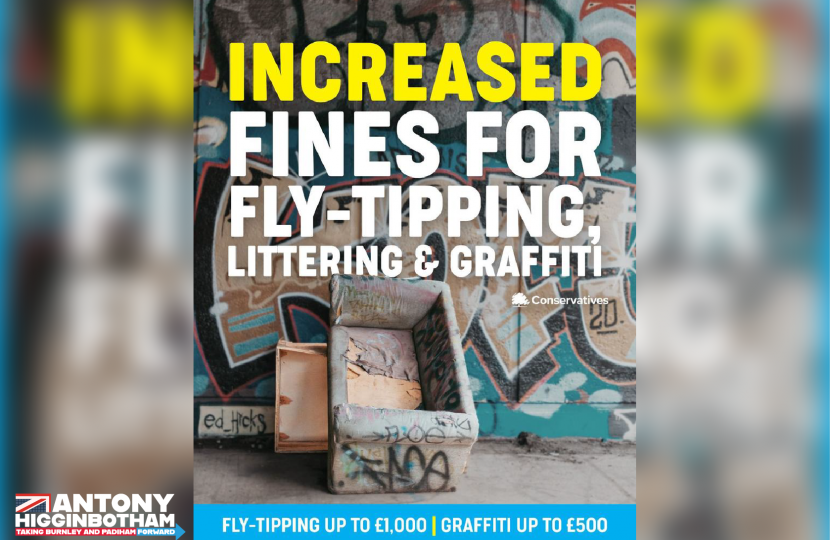
On-the spot fines for litter, graffiti and fly-tipping are set to more than double as government backed changes, supported by Conservative MPs and local MP Antony Higginbotham, introduces a tougher approach to this type of anti-social behaviour.
Under current rules Burnley Council, who are responsible for enforcement, can issue on the spot fines of up to £400 for fly tipping and £150 for littering and or graffiti. But under new guidance issued in Parliament those figures are set to see a dramatic increase with those caught fly tipping liable to fines of up to £1,000 and £500 for dropping litter and or causing graffiti.
The latest measures are intended to equip local councils with the powers they need to deter offenders and ensure perpetrators are brought to task.
Commenting on the ability of councils to increase fines for such offences local MP Antony Higginbotham said that he “welcomed this tough approach”.
In the time I’ve been the MP I’ve seen some disgusting examples of fly tipping. Fridges left on backstreets, dumped sofas and mattresses and natural beauty spots which have been left with rubbish strewn all over.
Thankfully this type of behaviour represents only a small minority of people who have no pride in our area. I’ve said many times that it comes down to catching offenders, and more resource has gone into that – most recently from funding given to the Council by our Police and Crime Commissioner for more hidden cameras.
But it’s important that the Council also takes a tough approach to this issue and hands out the maximum fines available. Parliament has granted the ability to deliver what people want to see happen, and I’ll be encouraging Burnley Council to implement it.
In addition to increasing the upper limit on fines, last week, the government has also launched a consultation on ringfencing the receipts from FPNs for litter and fly-tipping to fund local authorities’ enforcement and clean-up activities, such as spending the money raised from fining criminals on further enforcement officers.
This would see the money paid by criminals go directly back into repairing the damage from their crimes, or into enforcement efforts to prevent similar incidents from happening again.
The government wants councils to take a much tougher approach to this type of anti-social behaviour. Taking proportionate and effective enforcement action against people who intentionally or carelessly damage their environment is a practical step local authorities can take to change behaviour and deter others from offending.
Local authorities have the freedom to set the rates that offenders should pay, within the limits above.

